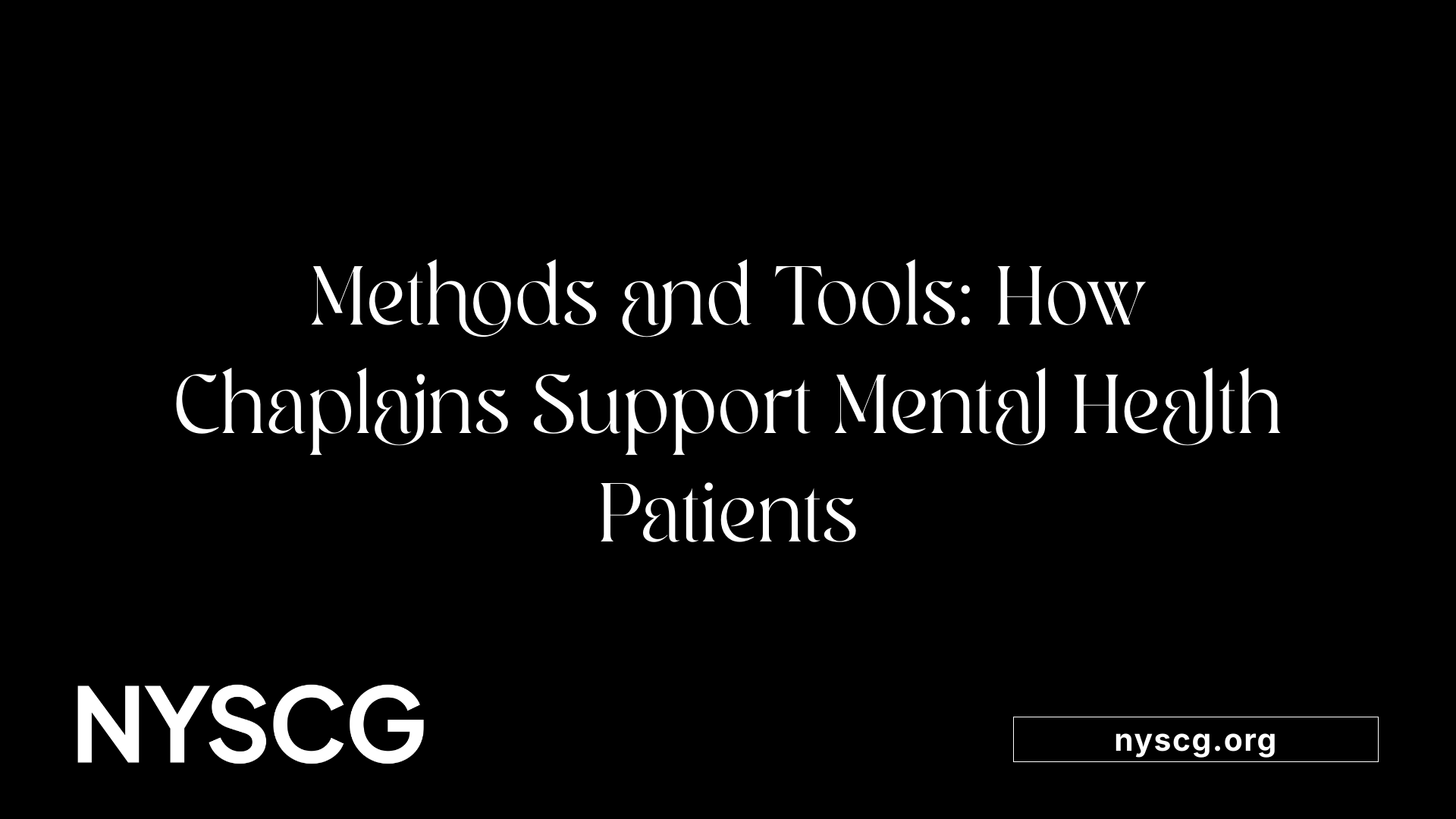Chaplains in Mental Health Hospitals: What They Do


In mental health hospitals, chaplains serve as integral members of the healthcare team, providing spiritual, emotional, and holistic support to patients, families, and staff. Their presence and services are key to addressing the comprehensive needs of individuals navigating mental health challenges, ensuring that care extends beyond the physical and psychological to include spiritual well-being, which can significantly impact recovery and resilience.

Hospital chaplains serve as vital members of the healthcare team in mental health facilities, acting as voices and bridges for patients with the mental health team. They provide spiritual and emotional support, help patients explore issues they might not disclose to clinicians, and address spiritual and religious needs that can impact mental health. Their presence ensures that care is holistic, recognizing the importance of spirituality in healing.
Chaplains engage with patients through assessments, counseling, and facilitating religious or spiritual rituals. They often work closely with healthcare professionals to provide comprehensive care that includes spiritual well-being, which can influence overall recovery outcomes.
Chaplains employ tools like spiritual care assessments, such as the FAITH assessment model, to identify patients' spiritual conflicts, strengths, and needs. They document their findings carefully and communicate these insights to the medical team to inform treatment plans.
They assist patients in exploring questions about life's purpose, spiritual distress, guilt, or loss—especially during crises. For example, a patient like Julia, suffering from depression due to religious guilt, was supported by a chaplain who used the assessment to convey her distress to her care team, facilitating targeted interventions. Similarly, Roberta's exploration of her spirituality helped her incorporate her beliefs into her recovery from addiction, leading to a year of sobriety.
Chaplains provide ongoing and crisis support to patients, families, and staff, especially during difficult diagnoses, treatment, or end-of-life situations. They offer a first line of emotional relief and help patients manage feelings of abandonment, guilt, or anxiety.
Using strategies such as prayer, meditation, rituals, and active listening, they help stabilize emotional reactions and promote resilience. Their support is crucial in environments where mental health challenges are compounded by spiritual distress or existential crises.
Chaplains lead or coordinate religious services, prayer sessions, sacraments, and rituals according to patients’ faiths. For instance, they organize Mass, Shabbat services, or Jewish healing ceremonies, and facilitate memorial or funeral services. These rituals provide comfort, a sense of community, and an opportunity for spiritual expression.
They also serve as mediators, interpreters, and cultural brokers, clarifying institutional policies and ensuring that religious practices are respected and observed within hospital settings.
Beyond patient care, chaplains also offer support to healthcare professionals by addressing their emotional and spiritual needs. They facilitate debriefings after difficult cases and help staff cope with stress and burnout.
For families, chaplains provide grief counseling, guidance during crises, and assistance with end-of-life decisions. They help families process loss and find meaning during traumatic events, fostering resilience and hope.
Spiritual and emotional care address the holistic needs of patients, encompassing their sense of purpose, meaning, and connectedness. These aspects are crucial for recovery, as they help patients develop coping strategies, foster resilience, and regulate emotions.
Support from faith communities and pastoral counseling can reduce feelings of loneliness and isolation, offering social support and a sense of belonging. Integrating spirituality enhances overall well-being, improves mental health outcomes, and complements clinical treatments.
By providing a safe space for spiritual exploration and supporting emotional resilience, chaplains deepen the healing process, helping patients find peace and hope amid their mental health journeys.

Chaplains play a vital role in mental health hospitals by employing a range of tools and techniques that address both emotional and spiritual needs. Their approach is holistic, recognizing that spiritual well-being is often intertwined with mental health.
One primary method is conducting spiritual care assessments and maintaining thorough documentation. These assessments help identify patients’ spiritual distress, conflicts, and strengths. A popular model used is the FAITH assessment, which explores Faith, Importance, Community, and Spirituality, helping communicate complex spiritual issues to the healthcare team.
Ministry of presence and advocacy are also central to chaplaincy. Simply being there for a patient — offering silent presence or active listening — provides comfort and reassurance. Chaplains act as advocates by bridging communication between patients and medical staff, ensuring spiritual concerns are integrated into care plans.
Supporting patients with issues like guilt, religious distress, or existential questions involves specific interventions such as prayer, rituals, and religious sacraments tailored to individual beliefs. For example, in one case, a patient named Julia was suffering from depression linked to religious guilt. Using the FAITH model, the chaplain identified her spiritual distress and worked with the treatment team to address it, aiding her recovery.
Chaplains are trained to use emotional management techniques for their own well-being, ensuring they can continue supporting others effectively. Strategies include engaging in prayer, meditation, physical activity, and participating in retreats or workshops that promote self-care.
Furthermore, chaplains serve as advocates and cultural brokers within healthcare settings. They help clarify institutional policies related to religious practice, assist with ethical decisions, and facilitate access to community faith resources.
Overall, chaplains’ methods are adaptable, personalized, and rooted in compassionate presence, ensuring that patients' spiritual needs support their overall health and healing process.

Becoming a hospital chaplain requires a combination of educational credentials, practical training, and personal skills. Most chaplains hold at least a master’s degree in theology, divinity, pastoral studies, or related fields. Many pursue a Master of Divinity (MDiv) degree, which provides comprehensive theological education alongside pastoral training.
A crucial step in their training is Clinical Pastoral Education (CPE). This program generally lasts about 12 weeks and involves supervised encounters with patients, seminars, and reflective practice. Completing multiple units of CPE (often four) is customary, as it helps chaplains develop the essential skills needed for direct patient care, counseling, and crisis intervention.
Certification plays a vital role in establishing credibility and professional standards. Recognized organizations such as the Association of Professional Chaplains (APC) or the National Association of Catholic Chaplains (NACC) offer certification. Endorsement or ordination from a faith community also often fulfills a requirement, ensuring that chaplains are accountable to religious bodies.
Beyond formal education, successful chaplains possess strong interpersonal and communication skills. They must be adept at active listening, demonstrating empathy, and managing emotional responses during stressful or sensitive situations. Crisis intervention skills are essential, as they frequently support patients experiencing severe health crises or spiritual distress.
Cultural competence is another critical attribute. Chaplains work with diverse patient populations, spanning various religious traditions, spiritual beliefs, and cultural backgrounds. Maintaining confidentiality and respecting patient autonomy are foundational to their practice.
Qualification/SkillDetailsAdditional NotesEducational DegreeMaster’s degree in theology, divinity, or pastoral careOften required; foundational for clinical and spiritual workClinical Pastoral Education (CPE)4-12 weeks of supervised practical trainingEnhances counseling and crisis response skillsCertification and EndorsementCertification from APC, NACC, or equivalent; faith community endorsementValidates professional competence and spiritual accountabilityInterpersonal SkillsEmpathy, active listening, emotional intelligenceCritical for patient trust and effective supportCrisis Intervention SkillsAbility to respond quickly and effectively to emergenciesOften gained through CPE and on-the-job experienceCultural CompetenceWorking effectively with diverse religious and cultural groupsRespecting beliefs and practices enhances care qualityExperience and ResidencyPrior healthcare experience, supervised residencies recommendedTypically up to two years of residency or mentorship programs
Many hospitals encourage or require aspiring chaplains to undergo supervised residency programs. These residencies can last up to two years and involve working closely with experienced chaplains. They enable candidates to refine their skills in real-world settings, learn about hospital operations, and gain confidence in handling complex spiritual and emotional needs.
Overall, the pathway to becoming a hospital chaplain demands formal theological education, specialized clinical training, certification, and a compassionate skill set tailored to a healthcare environment. This combination ensures that chaplains are well-equipped to provide holistic, respectful, and impactful spiritual care to diverse patient populations.

Hospital chaplains work closely with medical professionals to provide comprehensive care that addresses both the physical and spiritual well-being of patients. They are often considered essential members of the healthcare team, participating in rounds and patient conferences to communicate patient-specific spiritual and emotional needs.
During interdisciplinary care meetings, chaplains share insights derived from spiritual assessments and help develop personalized care plans that incorporate religious, cultural, and spiritual preferences. This collaborative approach ensures that treatments are sensitive to patients’ beliefs, values, and mental health concerns.
Chaplains also support shared decision-making by mediating conversations between patients, families, and healthcare providers. They help clarify religious or ethical questions that may influence medical choices, empowering patients to make informed decisions aligned with their values.
Engaging in regular communication, chaplains contribute to an integrated model of holistic care, which has been shown to improve patient satisfaction and clinical outcomes. Their presence facilitates a more compassionate environment, enabling healthcare teams to address emotional distress, spiritual questions, and existential concerns.
Hospitals increasingly recognize board-certified chaplains as vital team members. Many facilities allow chaplains to participate in medical rounds and chart their spiritual care interventions in patient records. This integration fosters a more coordinated approach, where the spiritual dimension supports overall healing.
Including chaplains in healthcare teams can also aid in managing complex cases involving end-of-life decisions, organ donations, or crises, where spiritual support plays a crucial role. By serving as cultural brokers and advocates, chaplains help bridge gaps between medical procedures and patients’ spiritual needs, ensuring a respectful, patient-centered approach.
Overall, their collaboration with healthcare teams enhances holistic, compassionate care that respects patient dignity and promotes emotional resilience.
Aspect of CollaborationRole in Healthcare SettingBenefitsAdditional DetailsTeamwork in multidisciplinary settingsParticipate in rounds, patient conferencesImproved communication, holistic careActive involvement in patient care planningParticipation in rounds and patient conferencesShare spiritual assessments, develop care plansBetter understanding of patient needsEnables immediate addressing of spiritual concernsSupporting shared decision-makingFacilitate ethical and religious discussionsAligns treatment with patient valuesSupports autonomy and moral considerationsEnhancing holistic careIntegrate spiritual support into medical treatmentImproves patient satisfaction, mental health outcomesAddresses emotional distress, existential issues
In summary, hospital chaplains serve as vital connectors within healthcare teams, fostering compassionate, patient-centered care. Their participation not only enriches the treatment process but also confirms the importance of spirituality in health and recovery.

Chaplains play an essential role in supporting mental health patients by adding a spiritual dimension to their care. They address emotional needs often unspoken in traditional treatment settings. Through tools like spiritual assessments and ongoing dialogue, chaplains help patients explore feelings of guilt, shame, or doubt, fostering inner resilience.
For example, in one case, a patient named Julia, suffering from severe depression linked to religious guilt, was supported by a chaplain using the FAITH assessment model. This intervention helped communicate her spiritual distress clearer to her treatment team, facilitating targeted support and recovery.
Similarly, Roberta, a patient battling addiction and spiritual confusion, benefited from integrating her faith into her treatment plan. As a result, she remained sober for a year, illustrating how spiritual support can contribute to behavioral change.
Chaplains act as a bridge, offering hope and fostering resilience by helping patients find meaning in their experiences. The ministry of presence—simply being present and listening—can reassure patients facing difficult diagnoses. Their emotional support helps reduce feelings of despair, encouraging a positive outlook.
In mental health settings, where patients often feel isolated or misunderstood, chaplains serve as trusted allies. Their interventions cultivate hope, often leading to improved engagement with other aspects of treatment.
Indeed, chaplains are trained to employ emotional management strategies that reduce distress. They help patients develop coping mechanisms like prayer, meditation, rituals, or self-care practices. For patients experiencing intense fear or anxiety, chaplain-led practices can serve as calming interventions.
Chaplains also assist patients in addressing existential concerns—questions about life's purpose, mortality, and life's meaning—thereby easing despair. Their presence offers emotional sanctuary, supporting mental stability.
Spiritual care complements psychological and medical treatments, creating a full-spectrum approach to healing. Chaplains evaluate spiritual needs, help reconcile religious conflicts, and assist in rituals or sacramental practices.
Added to this, chaplains serve as advocates, liaising with healthcare teams to ensure spiritual and emotional needs are incorporated into care plans. Their interventions can lead to shorter hospital stays and better overall mental health outcomes.
Research indicates that addressing spiritual needs leads to higher satisfaction with care. Patients report feeling more cared for and understood when spiritual discussions and rituals are part of their treatment.
This comprehensive approach helps improve adherence to treatment, emotional well-being, and overall quality of life, especially in long-term mental health care scenarios.
Multiple studies point to the positive impact of spiritual care. Enhanced chaplaincy services have been associated with reduced anxiety, improved coping skills, and quicker recovery times.
Furthermore, spiritual support may contribute to healthcare savings by reducing the need for extensive psychiatric interventions and hospital readmissions. As holistic care becomes more integrated into health systems, the economic benefits become increasingly evident.
AspectBenefitsSupporting DataRecovery SupportAddresses emotional and spiritual needsImproved treatment adherence and shorter hospital staysEmotional ResilienceFosters hope and resilienceCase studies showing positive psychological outcomesAnxiety and Stress ReductionCalming rituals and presencePatient-reported decreases in anxiety levelsPatient SatisfactionHigh satisfaction with inclusive spiritual careSurveys indicating increased patient and family satisfactionCost EffectivenessReduced treatment costs and readmissionsStudies linking spiritual care to economic savings
In conclusion, chaplaincy services significantly bolster patient recovery and well-being by fostering hope, resilience, and emotional stability. Their holistic approach not only improves individual health outcomes but also enhances overall healthcare efficiency.
The involvement of chaplains in mental health hospitals exemplifies the importance of integrating spiritual and emotional care into comprehensive treatment plans. As supportive mediators and advocates, they help foster hope, resilience, and a sense of purpose, which are fundamental to mental health recovery. Their collaboration with healthcare teams ensures that care remains holistic, respecting the diverse spiritual needs of every individual, ultimately leading to improved outcomes and a better quality of life for patients.
All you need is the will to make the world a better place.
New York State chaplain group inc. is a tax deductible organization with a federal tax Id number 92-383-4921